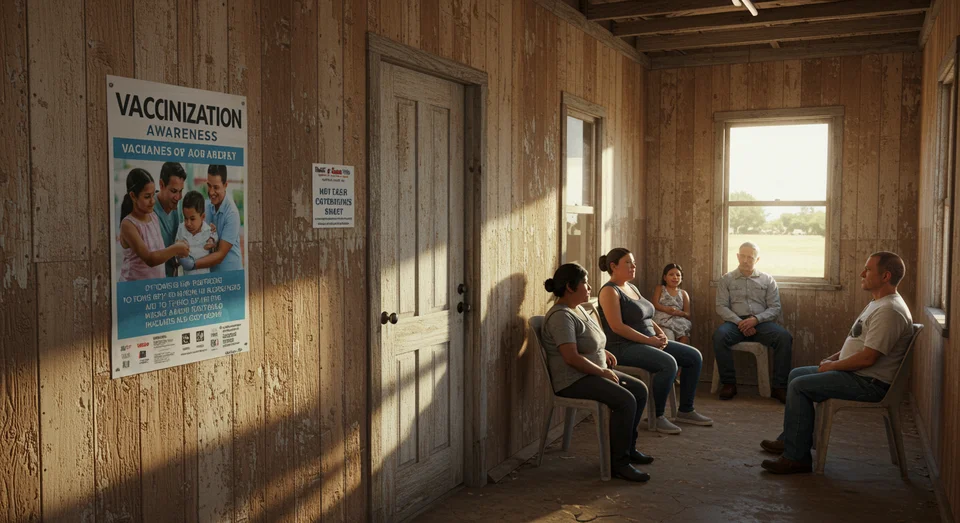Texas Measles Outbreak Claims 8-Year-Old, Sparks Debate on Vaccination and Public Health
234 views
A deadly measles outbreak in Texas has claimed its second local victim, 8-year-old Daisy Hildebrand, marking the third U.S. measles death this year. The tragedy underscores the resurgence of a disease once declared eliminated in the United States, with over 600 cases reported nationwide in 2025. Daisy's death, attributed to "measles pulmonary failure," has sent shockwaves through her community and reignited debates over vaccination policies and public health strategies.

Unraveling the Crisis: Measles Resurgence and Its Complex Implications
The outbreak, which has swept through unvaccinated Mennonite communities in Texas, New Mexico, Oklahoma, and potentially Kansas, reveals the vulnerabilities of insular groups resistant to vaccination. While isolated travel-related cases have emerged in over a dozen states, the epicenter remains firmly planted in these communities, where misinformation and mistrust of medical interventions have taken root. The death of Daisy Hildebrand, a previously healthy child with no pre-existing conditions, serves as a stark reminder of the disease’s potential to devastate even those who would otherwise be considered low-risk.
Daisy’s story is particularly poignant. Her family’s decision to forego vaccination was reportedly influenced by their religious beliefs and concerns about vaccine safety—a narrative mirrored in many of the affected communities. Her death marks the first measles fatality in the U.S. since 2015, a grim milestone that highlights the consequences of declining vaccination rates. Public health officials have emphasized the urgency of immunization, warning that measles, with its highly contagious nature and severe complications, poses a grave threat to unprotected populations.
In response to the outbreak, U.S. Secretary of Health and Human Services Robert F. Kennedy Jr. visited Texas, where he endorsed the MMR vaccine as the most effective tool for preventing measles. His support for vaccination represents a notable shift, given his controversial history of vaccine skepticism. Yet, Kennedy’s messaging was muddled by his simultaneous promotion of unproven treatments, including aerosolized steroids and antibiotics, as potential remedies for measles complications. These interventions lack robust scientific backing and carry risks, such as exacerbating respiratory issues or contributing to antibiotic resistance.
Kennedy’s advocacy for cod liver oil as a measles treatment has also drawn criticism. While vitamin A supplementation can be beneficial in severe cases of measles in malnourished populations, its application in the U.S. is unnecessary and potentially harmful. Reports of vitamin A toxicity in children underscore the dangers of such recommendations, particularly when they are not grounded in evidence-based medicine. Critics argue that Kennedy’s mixed messaging undermines public trust in proven interventions like the MMR vaccine and may inadvertently fuel hesitancy in communities already grappling with misinformation.
The outbreak’s concentration in Mennonite communities raises broader questions about the intersection of faith, autonomy, and public health. These groups often live in close-knit, rural settings where access to healthcare is limited and reliance on traditional practices is common. Efforts to address vaccine hesitancy in such communities require culturally sensitive approaches that respect their beliefs while emphasizing the collective responsibility to protect vulnerable populations. Public health campaigns tailored to these communities could play a pivotal role in curbing the spread of measles and preventing future outbreaks.
The resurgence of measles in the United States also highlights the fragility of herd immunity, which relies on high vaccination rates to protect those who cannot be immunized due to medical contraindications. As vaccination rates decline, pockets of susceptibility emerge, creating fertile ground for outbreaks. The current crisis serves as a cautionary tale about the dangers of complacency in public health and the need for sustained investment in education, outreach, and immunization programs.
Looking beyond the immediate crisis, the measles outbreak raises pressing questions about the role of leadership in shaping public health discourse. Kennedy’s dual endorsement of the MMR vaccine and unproven treatments reflects the complexities of navigating misinformation in an era where skepticism of science is pervasive. Leaders have a responsibility to provide clear, consistent messaging that prioritizes evidence-based practices, particularly in times of crisis. Mixed signals can erode trust and hinder efforts to combat preventable diseases.
As the nation grapples with the fallout from this outbreak, Daisy Hildebrand’s tragic death stands as a somber reminder of the human cost of vaccine hesitancy and misinformation. Her loss should galvanize efforts to strengthen immunization programs, foster trust in medical science, and address the underlying factors that contribute to outbreaks. While the path forward is fraught with challenges, it is imperative to act decisively to protect future generations from the scourge of preventable diseases.
